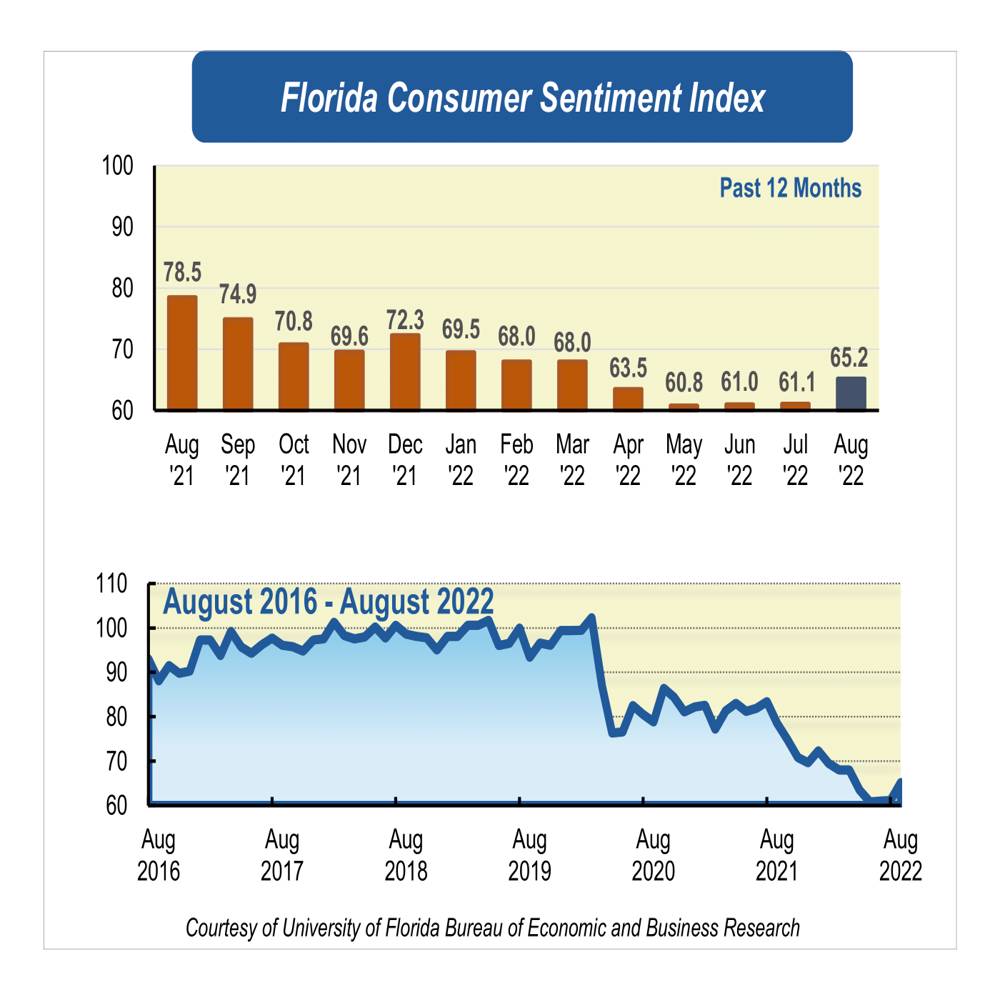
August consumer sentiment rebounds as inflation rate slows
Consumer sentiment among Floridians increased for a second month in a row in August to 65.2, up 4.1 points from a revised figure of 61.1 in July. Similarly, national consumer sentiment surged 6.7 points.
All five components that make up the index increased.
Floridians’ opinions about current economic conditions improved in August. Perceptions of personal financial situations now compared with a year ago increased 2.7 points from 52.5 to 55.2. As a striking coincidence, opinions as to whether now is a good time to buy a major household item like an appliance also increased by 2.7 points from 52.5 to 55.2. Importantly, these positive views were shared by all Floridians across sociodemographic groups except for people with an annual income under $50,000 who reported less-favorable views to the latter component.
Outlooks about expected economic conditions were also positive. Expectations of personal finances a year from now increased 4 points from 75.1 to 79.1, though, people with an annual income under $50,000 reported more pessimistic views. Expectations about the U.S. economic conditions over the next year increased 7.4 points from 58 to 65.4, the greatest increase of any reading this month. Notably, this view was shared by all Floridians across sociodemographic groups but were stronger among men, people 60 and older, and those with an annual income above $50,000. Finally, views of U.S. economic conditions over the next five years increased 3.8 points from 67.3 to 71.1, though, women reported slightly less-favorable views.
“Overall, Floridians are more optimistic in August. Most of the optimism stems from Floridian’s expectations about future economic outlooks, particularly from expectations about the national economy over the next year. These opinions are consistent with the strong labor market, along with falling energy prices, such as gasoline, and the overall slowdown in the pace of inflation from a four-decade high," said Hector Sandoval, director of the Economic Analysis Program at UF’s Bureau of Economic and Business Research.
“People's perceptions of the economy are typically influenced by gas prices, which they see every day while traveling to and from work. Gas prices in Florida have declined consistently since mid-June, not only improving Floridians' perception of the economy but also releasing pressure from their budgets,” Sandoval added.
The Florida labor market has continued to strengthen with more jobs being added statewide in July. Florida’s unemployment rate ticked down by 0.1 percentage point in July, reaching 2.7% and matching the rate observed in February 2020, right before the pandemic hit. Moreover, newly filed unemployment claims have hovered around pre-pandemic levels.
“Looking ahead, although consumer confidence has increased for two consecutive months, it is difficult to interpret this as an overall change in the trend, especially, since the Fed will keep rising interest rate until there is evidence that inflation pressures and the economy are cooling, thus possibly pushing the economy into a recession,” Sandoval said.
Conducted July 1 through August 25, the UF study reflects the responses of 203 individuals who were reached on cellphones and 274 individuals reached through an online panel, a total of 477 individuals, representing a demographic cross section of Florida. The index used by UF researchers is benchmarked to 1966, which means a value of 100 represents the same level of confidence for that year. The lowest index possible is a 2, the highest is 150.
Details of this month’s survey can be found at https://www.bebr.ufl.edu/florida-consumer-sentiment/
